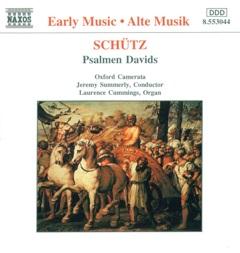Heinrich Schütz - Psalmen Davids (1994)
Heinrich Schütz - Psalmen Davids (1994)

1. An den Wassern zu Babel 00:06:05 2. Ach Herr, straf mich nicht mit deinem Zorn 00:05:07 3. Erhore mich, wenn ich rufe (SWV 289) 00:02:58 4. Singet dem Herrn ein neues Lied 00:06:10 5. Wohl dem, der nicht wandelt im Rat der Gottlosen 00:06:21 6. Ich liege und schlafe (SWV 310) 00:03:21 7. Wie lieblich sind deine Wohnungen 00:07:55 8. Lobe den Herren, meine Seele 00:06:27 9. Schein: Pavan (Suite XII) 00:03:27 10. Das ist je gewisslich wahr (SWV 277) 00:05:54 11. Schein: Pavan (Suite XVII) 00:02:44 12. Meine Seele erhebt den Herren 00:07:37 Oxford Camerata Laurence Cummings – organ Jeremy Summerly - conductor
At the age of 85 Heinrich Schutz (1585-1672) wrote his exuberant 'German Magnificat' as a thanksgiving for the grace of God manifest in his life. His Latin epitaph pays fitting tribute to him as "the Christian singer of psalms, a joy for foreigners, and a light for Germany".
At a time when the preferred religious texts for musical use were of either a devotional or introspective nature, Schutz was attracted to the dramatic aspects of sacred texts, especially from the Bible. Thus, in 1619 he produced a collection of 26 Anthems, the 'Psalmen Davids', explicitly stating his indebtedness to Gabrieli and using a variety of colors and textures for his settings, which followed the recent local fashion of using German for psalm texts in preference to prevailing Latin. Moreover, Schutz provided detailed instructions on the disposition of voices and the use of instruments; the choirs sometimes have parallel ranges, sometimes they are divided into high and low sections, and on occasion soloists are required.
The Italian influence is evident not only in the vocal textures but also in Schutz's transformation of poetry into music. The following traits are evident: declamatory characteristics of individual phrases thus varying the pace from solemn stateliness to vigorous insistence sometimes using repetition and echo; Schutz also utilizes the rich qualities of the German vowel sounds and the sparkle of the consonents to strong emotional effect.
The Oxford Camerata, under the capable direction of Jeremy Summerly, consists of twelve members on this recording; it is a mixed group made up basically of singers who have already made somewhat of a name for themselves on an individual basis; some of whom are notable such as Robin Blaze, Rebecca Outram, Andrew Carwood, James Gilchrist and Michael McCarthy, to name a few. Their performance is beyond reproach: it is emotionally moving, displays a balanced blend of voices, dictionally perfect and certainly more that does justice to this powerful program. I prefer not to pick at what isn't or is here in the selections.
Some quotations concerning this recording are: GRAMOPHONE: "Oxford Camerata" rises excellently to the challenge". FANFARE: "The singing and interpretations are lovely, as is the engineering". THE SUNDAY TIMES,SEPT.1996: "...a fine introduction to the historically crucial - and very beautiful music of Heinrich Schutz...The disc ends with the great German Magnificat, which here makes an impact of magnificent but confidential immensity, which is surely right." --- Matyas Becvarov, amazon.com
download (mp3 @320 kbs):
yandex 4shared mega mediafire zalivalka cloudmailru uplea








